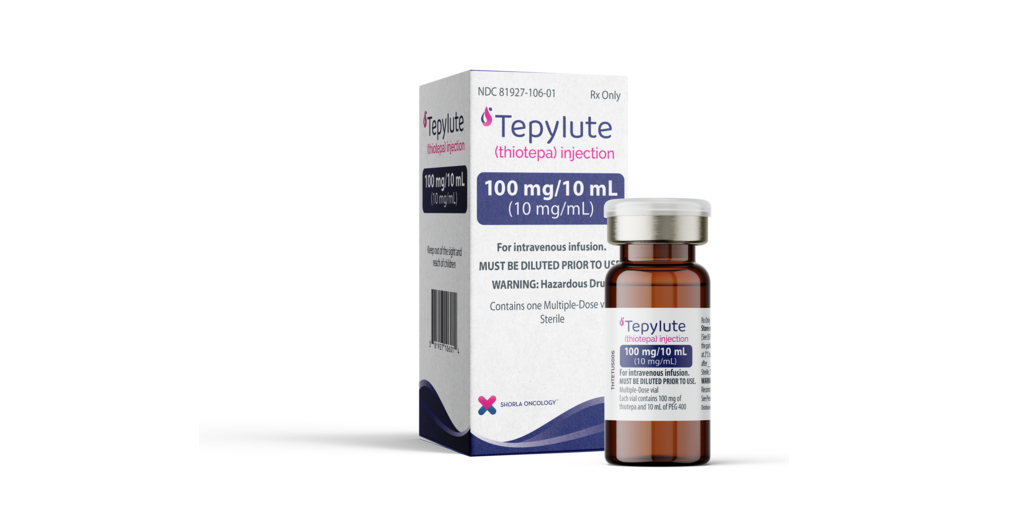TEPYLUTE 100mg is the first multi-dose formulation of thiotepa that is stable for 14 days when properly stored. TEPYLUTE is Shorla Oncology’s fourth launch in the U.S. Market.
CAMBRIDGE, Mass.--(BUSINESS WIRE)--#BreastCancer--Shorla Oncology (‘Shorla’), a U.S.-Ireland specialty pharmaceutical company, announced today that the U.S. Food and Drug Administration has granted approval for 100 mg/10mL multi-dose vial of TEPYLUTE, a ready-to-dilute formulation of thiotepa to treat breast and ovarian cancer, that eliminates the need for reconstitution and may reduce preparation time and errors offering more scheduling flexibility for their patients.




“We are pleased to offer another viable treatment option for patients with breast and ovarian cancer,” said Sharon Cunningham, Chief Executive Officer and Co-Founder of Shorla Oncology. “Once opened, our 100mg vial of TEPYLUTE is stable for 14 days when properly stored, giving providers the flexibility they need when preparing and administering this very important treatment.
TEPYLUTE is a ready to dilute formulation of a well-established, standard of care oncology drug thiotepa that has been manufactured as freeze-dried powder since the 1950s.
“This is a huge win for providers because TEPYLUTE avoids the need for complicated and time-consuming reconstitution,” said Orlaith Ryan, Chief Technical Officer and Co-Founder of Shorla Oncology.
We are excited to bring TEPYLUTE to the US Market. It provides consistent dosing accuracy and allows for “just in time” preparation, which benefits everyone, especially patients.” said Rayna Herman, Chief Commercial Officer, Shorla Oncology.
The American Cancer Society estimates that more than 300,000 women will be diagnosed with breast cancer in the U.S in 2025.2 About 20,890 women will be diagnosed with ovarian cancer in the U.S. in 2025.3
About Shorla Oncology
Shorla Oncology is a privately- held, U.S. and Ireland- based commercial stage specialty pharmaceutical company established by Sharon Cunningham and Orlaith Ryan. The company has an advanced pipeline of innovative oncology drugs for orphan and pediatric cancers. Shorla is focused on indications where existing treatments are limited, in shortage or the drug applications are inadequate for the target population. The company’s growing portfolio brings accessible, affordable and life-saving treatments to patients, delivering a major contribution to patient care. Shorla currently markets three products, Nelarabine for the treatment of T-cell leukemia, JYLAMVO™ for the treatment of acute lymphoblastic leukemia and other indications and IMKELDI for the treatment of Chronic Myeloid Leukemia, Gastrointestinal Stromal Tumors (GISTs) and other indications.
For further information, please visit www.shorlaoncology.com.
TEPYLUTE® (thiotepa) Injection for Intravenous Use
INDICATION
TEPYLUTE is an alkylating drug indicated for the treatment of adenocarcinoma of the breast or ovary.
IMPORTANT SAFETY INFORMATION
WARNING: SEVERE MYELOSUPPRESSION and CARCINOGENICITY |
|
• TEPYLUTE may cause severe marrow suppression, and high doses may cause marrow ablation with resulting infection or bleeding. Monitor hematologic laboratory parameters. |
|
• TEPYLUTE should be considered potentially carcinogenic in humans. |
CONTRAINDICATIONS
- TEPYLUTE is contraindicated in patients with severe hypersensitivity to thiotepa and in concomitant use with live or attenuated vaccines.
WARNINGS AND PRECAUTIONS
- Myelosuppression: For patients receiving TEPYLUTE for treatment of adenocarcinoma of the breast or adenocarcinoma of the ovary, if the bone marrow has been compromised by prior irradiation or chemotherapy, or is recovering from chemotherapy, the risk of severe myelosuppression with TEPYLUTE may be increased. Perform periodic complete blood counts during the course of treatment with TEPYLUTE. Provide supportive care for infections, bleeding, and symptomatic anemia. Inform patients of the possibility of developing low blood cell counts and the need for hematopoietic progenitor cell infusion. Instruct patients to immediately report to their healthcare provider if bleeding or fever occurs.
- Hypersensitivity: Clinically significant hypersensitivity reactions, including anaphylaxis, have occurred following administration of thiotepa. If anaphylactic or other clinically significant allergic reaction occurs, discontinue treatment with TEPYLUTE, initiate appropriate therapy, and monitor until signs and symptoms resolve. Counsel patients on the signs and symptoms of hypersensitivity and to seek immediate emergency assistance if they develop any of these signs and symptoms.
- Cutaneous Toxicity: TEPYLUTE and/or its active metabolites may be excreted in part via skin in patients receiving high-dose therapy. Treatment with TEPYLUTE may cause skin discoloration, pruritus, blistering, desquamation, and peeling that may be more severe in the groin, axillae, skin folds, in the neck area, and under dressings. Instruct patients to shower or bathe with water at least twice daily through 48 hours after administration of TEPYLUTE. Change the occlusive dressing and clean the covered skin at least twice daily through 48 hours after administration of TEPYLUTE. Change bed sheets daily during treatment. Skin reactions associated with accidental exposure to TEPYLUTE may occur. Wash the skin thoroughly with soap and water in case the TEPYLUTE solution contacts the skin. Flush mucous membranes in case of TEPYLUTE contact with mucous membranes.
- Concomitant Use of Live and Attenuated Vaccines: Do not administer live or attenuated viral or bacterial vaccines to a patient treated with TEPYLUTE until the immunosuppressive effects have resolved.
- Hepatic Veno-Occlusive Disease: Monitor by physical examination, serum transaminases, and bilirubin, and provide supportive care to patients who develop hepatic veno-occlusive disease.
- Central Nervous System Toxicity: Fatal encephalopathy has occurred in patients treated with high doses of thiotepa. Other central nervous system toxicities, such as headache, apathy, psychomotor retardation, disorientation, confusion, amnesia, hallucinations, drowsiness, somnolence, seizures, coma, inappropriate behavior, and forgetfulness have been reported to occur in a dose-dependent manner during or shortly after administration of high-dose thiotepa. Do not exceed the recommended dose of TEPYLUTE. If severe or life-threatening central nervous system toxicity occurs, discontinue administration of TEPYLUTE and provide supportive care.
- Carcinogenicity: Like many alkylating agents, thiotepa has been reported to be carcinogenic when administered to laboratory animals. Carcinogenicity is shown most clearly in studies using mice, but there is some evidence of carcinogenicity in man. There is an increased risk of secondary malignancy with the use of TEPYLUTE. Inform patients that TEPYLUTE can increase the risk of secondary malignancy.
- Polyethylene glycol (PEG) 400 toxicity: TEPYLUTE contains a high concentration of PEG 400. Based on findings in animals, administration of high amounts of PEG 400 may cause damage to the kidneys and liver at dosages higher than recommended. When prescribing TEPYLUTE, take into consideration the PEG 400 load from concomitant medications.
- Embryo-Fetal Toxicity: Based on the mechanism of action and findings in animals, TEPYLUTE can cause fetal harm when administered to a pregnant woman. There are no adequate and well-controlled studies of TEPYLUTE in pregnant women. Thiotepa given by the intraperitoneal (IP) route was teratogenic in mice at doses ≥1 mg/kg (3.2 mg/m2), approximately 8-fold less than the maximum recommended human therapeutic dose (0.8 mg/kg, 27 mg/m2), based on body-surface area. Thiotepa given by the IP route was teratogenic in rats at doses ≥3 mg/kg (21 mg/m2), approximately equal to the maximum recommended human therapeutic dose, based on body-surface area. Thiotepa was lethal to rabbit fetuses at a dose of 3 mg/kg (41 mg/m2), approximately two times the maximum recommended human therapeutic dose based on body-surface area. Advise pregnant women and females of reproductive potential of the potential risk to the fetus. Advise females of reproductive potential to use highly effective contraception during TEPYLUTE treatment and for 6 months after therapy/the last dose. Advise females of reproductive potential to inform their healthcare provider if they are pregnant or become pregnant. Advise males with female partners of reproductive potential to use effective contraception during TEPYLUTE treatment and for 1 year after therapy/the last dose.
ADVERSE REACTIONS
The most common adverse reactions (incidence greater than 10%) are neutropenia, anemia, thrombocytopenia, elevated alanine aminotransferase, elevated aspartate aminotransferase (AST), elevated bilirubin, mucositis, cytomegalovirus infection, hemorrhage, diarrhea, hematuria, and rash.
The clinically significant adverse reactions include myelosuppression, infection, hypersensitivity, cutaneous toxicity, hepatic veno-occlusive disease, central nervous system toxicity, and carcinogenicity.
DRUG INTERACTIONS
Effect of Cytochrome CYP3A Inhibitors and Inducers: In vitro studies suggest that thiotepa is metabolized by CYP3A4 and CYP2B6 to its active metabolite triethylene phosphoramide (TEPA). Avoid coadministration of strong CYP3A4 inhibitors (e.g., itraconazole, clarithromycin, ritonavir) and strong CYP3A4 inducers (e.g., rifampin, phenytoin) with thiotepa due to the potential effects on efficacy and toxicity. Consider alternative medications with no or minimal potential to inhibit or induce CYP3A4. If concomitant use of strong CYP3A4 modulators cannot be avoided, closely monitor for adverse drug reactions.
Effect of TEPYLUTE on Cytochrome CYP2B6 Substrates: In vitro studies suggest that thiotepa inhibits CYP2B6. Thiotepa may increase the exposure of drugs that are substrates of CYP2B6 in patients; however, the clinical relevance of this in vitro interaction is unknown. The administration of thiotepa with cyclophosphamide in patients reduces the conversion of cyclophosphamide to the active metabolite, 4‑hydroxycyclophosphamide; the effect appears sequence-dependent with a greater reduction in the conversion to 4-hydroxycyclophosphamide when thiotepa is administered 1.5 hours before the intravenous administration of cyclophosphamide compared to administration of thiotepa after intravenous cyclophosphamide. The reduction in 4-hydroxycyclophosphamide levels may potentially reduce the efficacy of cyclophosphamide treatment.
USE IN SPECIFIC POPULATIONS
Pregnancy: TEPYLUTE can cause fetal harm when administered to a pregnant woman based on findings from animals and the drug’s mechanism of action. Limited available data on thiotepa use in pregnant women are insufficient to inform a drug-associated risk of major birth defects and miscarriage. In animal reproduction studies, administration of thiotepa to pregnant mice and rats during organogenesis produced teratogenic effects (neural tube defects and malformations of the skeletal system of the fetus) at doses approximately 0.125 and 1 times, respectively, the maximum recommended human daily dose on a mg/m2 basis. Thiotepa was lethal to rabbit fetuses at approximately 2 times the maximum recommended human therapeutic dose based on body-surface area. Consider the benefits and risks of TEPYLUTE for the mother and possible risks to the fetus when prescribing TEPYLUTE to a pregnant woman.
Lactation: There is no information regarding the presence of thiotepa in human milk, the effects on the breastfed infant, or the effects on milk production. Because of the potential for serious adverse reactions, including the potential for tumorigenicity shown for thiotepa in animal studies, advise patients not to breastfeed during TEPYLUTE treatment and for 1 week after therapy/the last dose.
Females and Males of Reproductive Potential:
TEPYLUTE can cause fetal harm when administered to a pregnant woman.
Pregnancy Testing - Verify the pregnancy status of females of reproductive potential before initiating TEPYLUTE therapy.
Contraception for Females - Advise females of reproductive potential to avoid pregnancy during TEPYLUTE treatment and for 6 months after therapy/the last dose. Advise females to immediately report pregnancy.
Contraception for Males - TEPYLUTE may damage spermatozoa and testicular tissue, resulting in possible genetic abnormalities. Males with female sexual partners of reproductive potential should use effective contraception during TEPYLUTE treatment and for 1 year after therapy/the last dose.
Infertility - Based on nonclinical findings, male and female fertility may be compromised by treatment with TEPYLUTE. Advise patients that TEPYLUTE can produce infertility. Inform male patients about the possibility of sperm conservation before the start of therapy.
Pediatric Use: Safety and effectiveness of TEPYLUTE in neonates have not been established. Safety and effectiveness of TEPYLUTE for the treatment of adenocarcinoma of the breast and adenocarcinoma of the ovary in pediatric patients have not been established.
Geriatric Use: Clinical studies of thiotepa for treatment of adenocarcinoma of the breast and adenocarcinoma of the ovary did not include sufficient numbers of subjects aged 65 years and over to determine whether elderly subjects respond differently from younger subjects, and other reported clinical experience has not identified differences in responses between the elderly and younger patients. In general, dose selection for an elderly patient should be cautious, usually starting at the low end of the dosing range, reflecting the greater frequency of decreasing hepatic, renal, or cardiac function, and of concomitant disease or other drug therapy.
Renal Impairment: In patients with moderate (creatinine clearance [CLcr] of 30 mL/min to 59 mL/min) renal impairment, decreased renal excretion may result in increased plasma levels of thiotepa and TEPA. This may result in increased toxicity. Monitor patients with moderate to severe (CLcr <30 mL/min) renal impairment for signs and symptoms of toxicity following treatment with TEPYLUTE for an extended period of time.
Hepatic Impairment: Thiotepa is extensively metabolized in the liver. Patients with moderate (bilirubin levels greater than 1.5 times to 3 times the upper limit of normal and any AST) hepatic impairment may have increased plasma levels of thiotepa. This may result in toxicity. Monitor patients with moderate to severe (bilirubin levels greater than 3 times the upper limit of normal and any AST) hepatic impairment for signs and symptoms of toxicity following treatment with TEPYLUTE for an extended period of time.
To report suspected adverse reactions, contact Shorla Oncology at 1-844-668-3940 or FDA at 1-800-FDA-1088 or www.fda.gov/medwatch.
For Print: Please see the accompanying full Prescribing Information, including Boxed Warning.
For Digital: Please click here for full Prescribing Information, including Boxed Warning.
All trademarks are the property of Shorla Oncology. ©SHORLA ONCOLOGY® 2025. PRO-TEP-1377-v1 04/2025
Contacts
Media Contact:
Dawn Fallon
New Dawn Communications LLC
dfallon@newdawncomms.com
732-771-7808




